Professional Identity 92434: Ethical Dilemma Case Study Analysis
VerifiedAdded on 2022/11/19
|8
|2274
|123
Case Study
AI Summary
This case study analyzes an ethical dilemma encountered by a registered nurse (RN) named Sam in the emergency department, where a 15-year-old patient, Jessica, faints and is found to be pregnant. Jessica does not want her mother to know. The assignment requires the student to address this ethical issue, which involves conflicts between patient autonomy, confidentiality, beneficence, and non-maleficence. The student identifies these principles and explores the legal implications of involving or not involving the parents, given Jessica's age. The student proposes two options for Sam, including educating Jessica on the importance of informing her mother and having a personal conversation with Jessica's mother. The student concludes that informing the mother is the most appropriate course of action, aligning with the International Council of Nurses (ICN) Code of Ethics and ensuring the best health outcome for the patient. The assignment also reflects on the student's perspective if they were in Sam's position, emphasizing the need to support the patient and the importance of family involvement in a minor's healthcare decisions, referencing relevant literature to support the analysis.
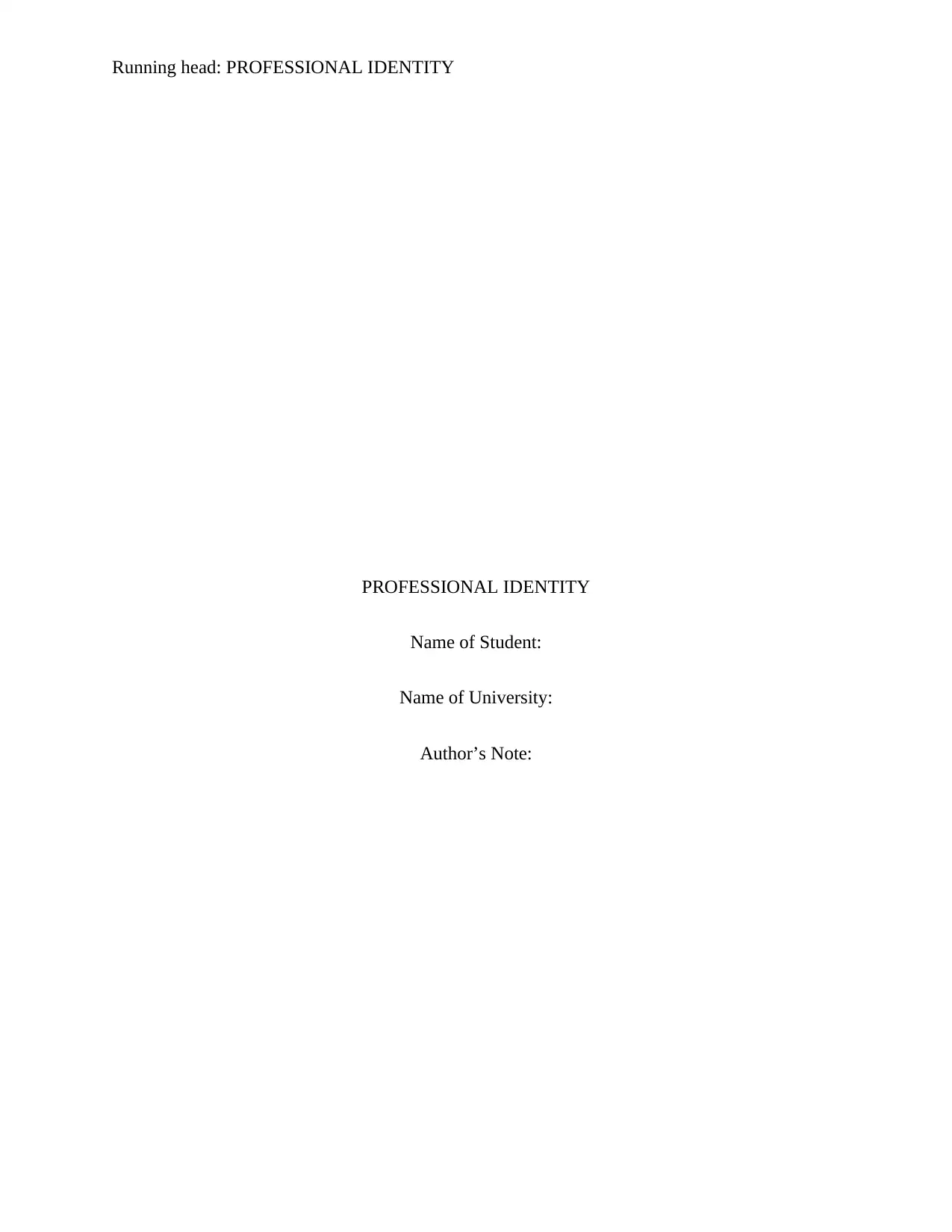
Running head: PROFESSIONAL IDENTITY
PROFESSIONAL IDENTITY
Name of Student:
Name of University:
Author’s Note:
PROFESSIONAL IDENTITY
Name of Student:
Name of University:
Author’s Note:
Paraphrase This Document
Need a fresh take? Get an instant paraphrase of this document with our AI Paraphraser
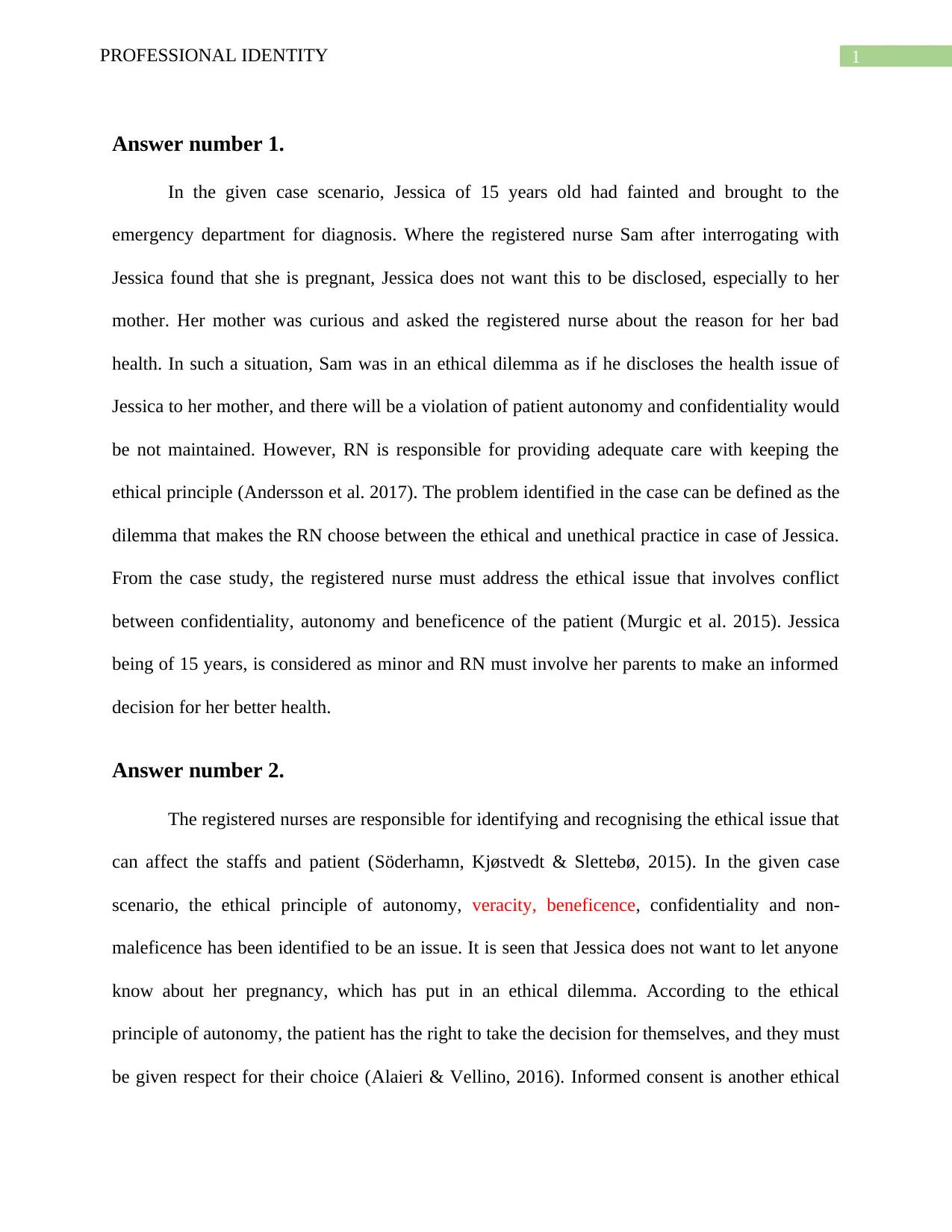
1PROFESSIONAL IDENTITY
Answer number 1.
In the given case scenario, Jessica of 15 years old had fainted and brought to the
emergency department for diagnosis. Where the registered nurse Sam after interrogating with
Jessica found that she is pregnant, Jessica does not want this to be disclosed, especially to her
mother. Her mother was curious and asked the registered nurse about the reason for her bad
health. In such a situation, Sam was in an ethical dilemma as if he discloses the health issue of
Jessica to her mother, and there will be a violation of patient autonomy and confidentiality would
be not maintained. However, RN is responsible for providing adequate care with keeping the
ethical principle (Andersson et al. 2017). The problem identified in the case can be defined as the
dilemma that makes the RN choose between the ethical and unethical practice in case of Jessica.
From the case study, the registered nurse must address the ethical issue that involves conflict
between confidentiality, autonomy and beneficence of the patient (Murgic et al. 2015). Jessica
being of 15 years, is considered as minor and RN must involve her parents to make an informed
decision for her better health.
Answer number 2.
The registered nurses are responsible for identifying and recognising the ethical issue that
can affect the staffs and patient (Söderhamn, Kjøstvedt & Slettebø, 2015). In the given case
scenario, the ethical principle of autonomy, veracity, beneficence, confidentiality and non-
maleficence has been identified to be an issue. It is seen that Jessica does not want to let anyone
know about her pregnancy, which has put in an ethical dilemma. According to the ethical
principle of autonomy, the patient has the right to take the decision for themselves, and they must
be given respect for their choice (Alaieri & Vellino, 2016). Informed consent is another ethical
Answer number 1.
In the given case scenario, Jessica of 15 years old had fainted and brought to the
emergency department for diagnosis. Where the registered nurse Sam after interrogating with
Jessica found that she is pregnant, Jessica does not want this to be disclosed, especially to her
mother. Her mother was curious and asked the registered nurse about the reason for her bad
health. In such a situation, Sam was in an ethical dilemma as if he discloses the health issue of
Jessica to her mother, and there will be a violation of patient autonomy and confidentiality would
be not maintained. However, RN is responsible for providing adequate care with keeping the
ethical principle (Andersson et al. 2017). The problem identified in the case can be defined as the
dilemma that makes the RN choose between the ethical and unethical practice in case of Jessica.
From the case study, the registered nurse must address the ethical issue that involves conflict
between confidentiality, autonomy and beneficence of the patient (Murgic et al. 2015). Jessica
being of 15 years, is considered as minor and RN must involve her parents to make an informed
decision for her better health.
Answer number 2.
The registered nurses are responsible for identifying and recognising the ethical issue that
can affect the staffs and patient (Söderhamn, Kjøstvedt & Slettebø, 2015). In the given case
scenario, the ethical principle of autonomy, veracity, beneficence, confidentiality and non-
maleficence has been identified to be an issue. It is seen that Jessica does not want to let anyone
know about her pregnancy, which has put in an ethical dilemma. According to the ethical
principle of autonomy, the patient has the right to take the decision for themselves, and they must
be given respect for their choice (Alaieri & Vellino, 2016). Informed consent is another ethical
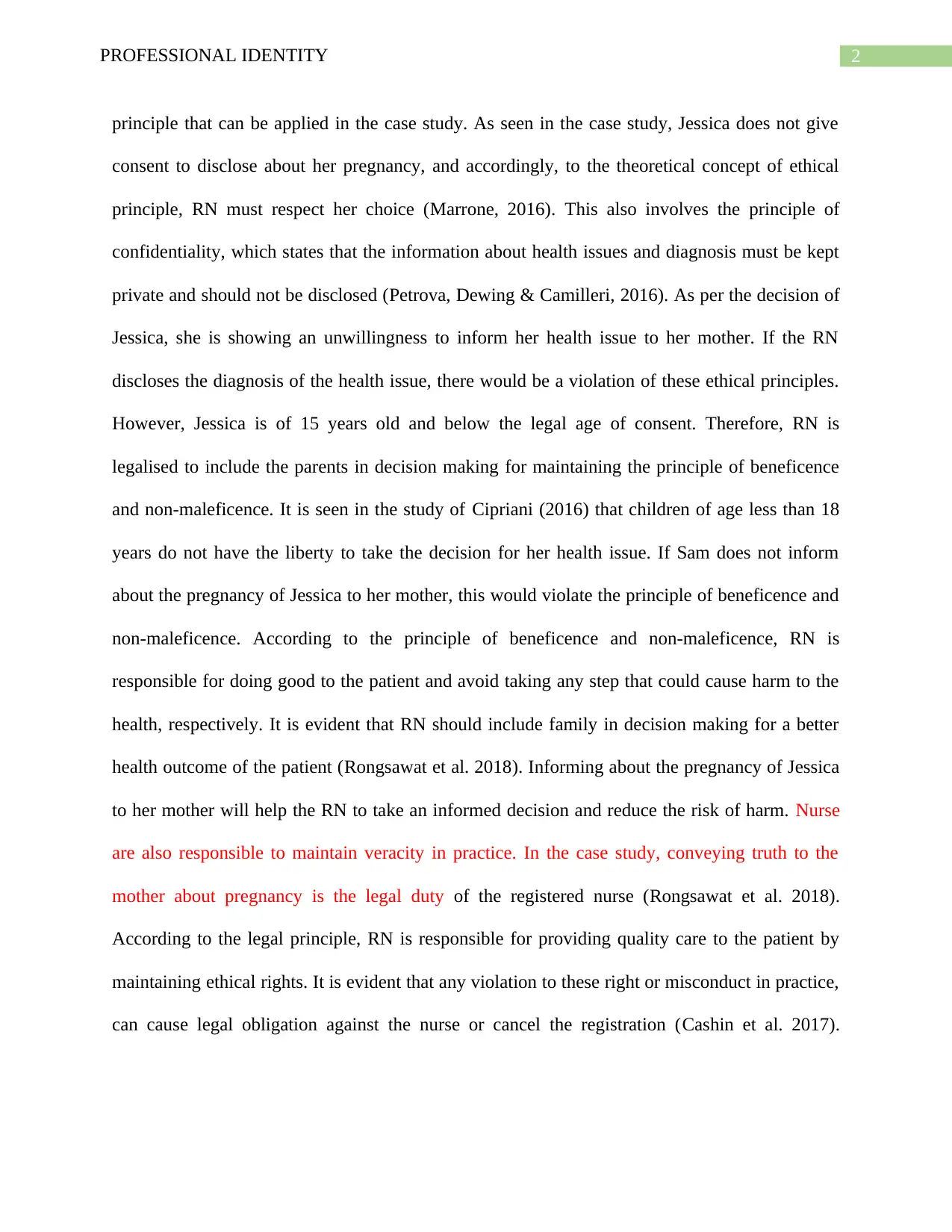
2PROFESSIONAL IDENTITY
principle that can be applied in the case study. As seen in the case study, Jessica does not give
consent to disclose about her pregnancy, and accordingly, to the theoretical concept of ethical
principle, RN must respect her choice (Marrone, 2016). This also involves the principle of
confidentiality, which states that the information about health issues and diagnosis must be kept
private and should not be disclosed (Petrova, Dewing & Camilleri, 2016). As per the decision of
Jessica, she is showing an unwillingness to inform her health issue to her mother. If the RN
discloses the diagnosis of the health issue, there would be a violation of these ethical principles.
However, Jessica is of 15 years old and below the legal age of consent. Therefore, RN is
legalised to include the parents in decision making for maintaining the principle of beneficence
and non-maleficence. It is seen in the study of Cipriani (2016) that children of age less than 18
years do not have the liberty to take the decision for her health issue. If Sam does not inform
about the pregnancy of Jessica to her mother, this would violate the principle of beneficence and
non-maleficence. According to the principle of beneficence and non-maleficence, RN is
responsible for doing good to the patient and avoid taking any step that could cause harm to the
health, respectively. It is evident that RN should include family in decision making for a better
health outcome of the patient (Rongsawat et al. 2018). Informing about the pregnancy of Jessica
to her mother will help the RN to take an informed decision and reduce the risk of harm. Nurse
are also responsible to maintain veracity in practice. In the case study, conveying truth to the
mother about pregnancy is the legal duty of the registered nurse (Rongsawat et al. 2018).
According to the legal principle, RN is responsible for providing quality care to the patient by
maintaining ethical rights. It is evident that any violation to these right or misconduct in practice,
can cause legal obligation against the nurse or cancel the registration (Cashin et al. 2017).
principle that can be applied in the case study. As seen in the case study, Jessica does not give
consent to disclose about her pregnancy, and accordingly, to the theoretical concept of ethical
principle, RN must respect her choice (Marrone, 2016). This also involves the principle of
confidentiality, which states that the information about health issues and diagnosis must be kept
private and should not be disclosed (Petrova, Dewing & Camilleri, 2016). As per the decision of
Jessica, she is showing an unwillingness to inform her health issue to her mother. If the RN
discloses the diagnosis of the health issue, there would be a violation of these ethical principles.
However, Jessica is of 15 years old and below the legal age of consent. Therefore, RN is
legalised to include the parents in decision making for maintaining the principle of beneficence
and non-maleficence. It is seen in the study of Cipriani (2016) that children of age less than 18
years do not have the liberty to take the decision for her health issue. If Sam does not inform
about the pregnancy of Jessica to her mother, this would violate the principle of beneficence and
non-maleficence. According to the principle of beneficence and non-maleficence, RN is
responsible for doing good to the patient and avoid taking any step that could cause harm to the
health, respectively. It is evident that RN should include family in decision making for a better
health outcome of the patient (Rongsawat et al. 2018). Informing about the pregnancy of Jessica
to her mother will help the RN to take an informed decision and reduce the risk of harm. Nurse
are also responsible to maintain veracity in practice. In the case study, conveying truth to the
mother about pregnancy is the legal duty of the registered nurse (Rongsawat et al. 2018).
According to the legal principle, RN is responsible for providing quality care to the patient by
maintaining ethical rights. It is evident that any violation to these right or misconduct in practice,
can cause legal obligation against the nurse or cancel the registration (Cashin et al. 2017).
⊘ This is a preview!⊘
Do you want full access?
Subscribe today to unlock all pages.

Trusted by 1+ million students worldwide
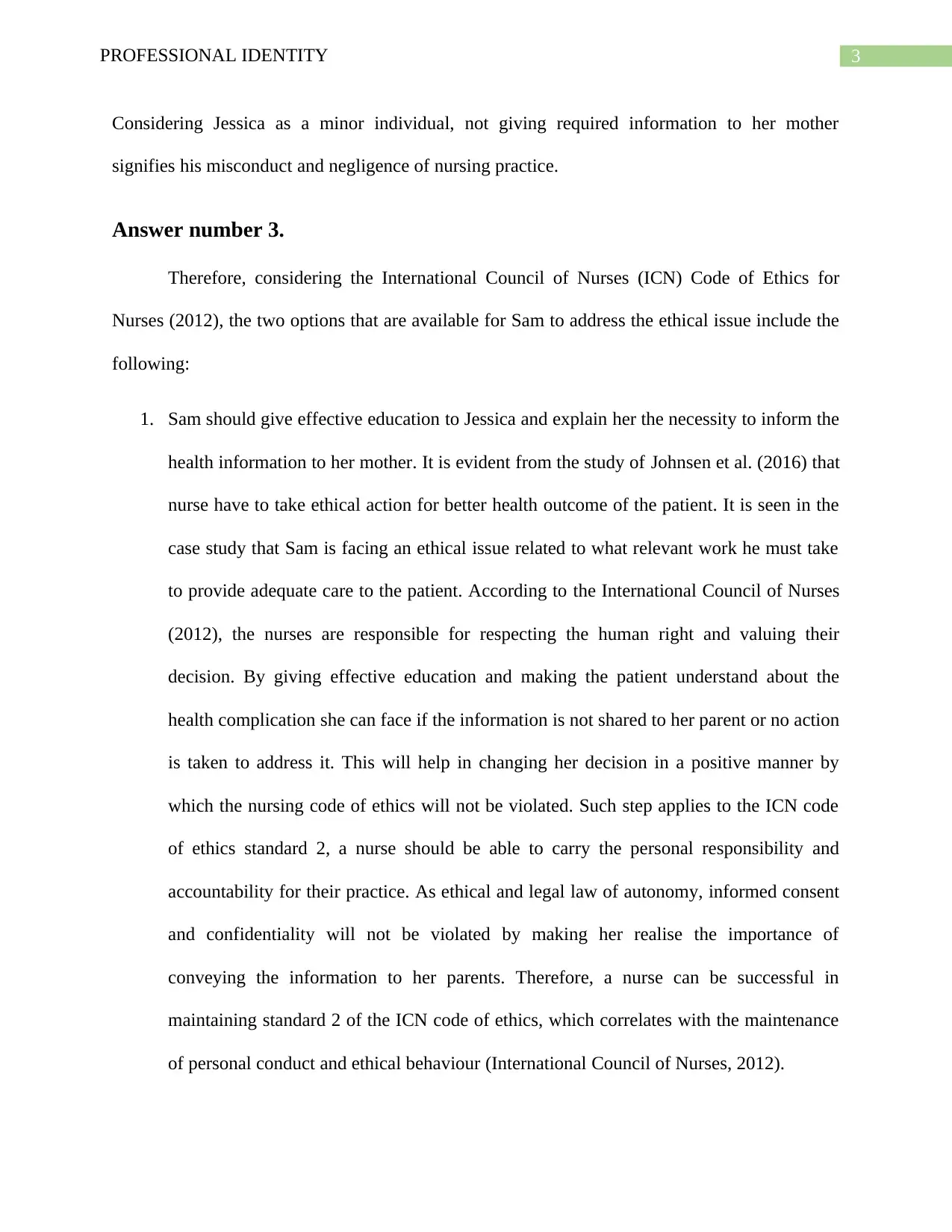
3PROFESSIONAL IDENTITY
Considering Jessica as a minor individual, not giving required information to her mother
signifies his misconduct and negligence of nursing practice.
Answer number 3.
Therefore, considering the International Council of Nurses (ICN) Code of Ethics for
Nurses (2012), the two options that are available for Sam to address the ethical issue include the
following:
1. Sam should give effective education to Jessica and explain her the necessity to inform the
health information to her mother. It is evident from the study of Johnsen et al. (2016) that
nurse have to take ethical action for better health outcome of the patient. It is seen in the
case study that Sam is facing an ethical issue related to what relevant work he must take
to provide adequate care to the patient. According to the International Council of Nurses
(2012), the nurses are responsible for respecting the human right and valuing their
decision. By giving effective education and making the patient understand about the
health complication she can face if the information is not shared to her parent or no action
is taken to address it. This will help in changing her decision in a positive manner by
which the nursing code of ethics will not be violated. Such step applies to the ICN code
of ethics standard 2, a nurse should be able to carry the personal responsibility and
accountability for their practice. As ethical and legal law of autonomy, informed consent
and confidentiality will not be violated by making her realise the importance of
conveying the information to her parents. Therefore, a nurse can be successful in
maintaining standard 2 of the ICN code of ethics, which correlates with the maintenance
of personal conduct and ethical behaviour (International Council of Nurses, 2012).
Considering Jessica as a minor individual, not giving required information to her mother
signifies his misconduct and negligence of nursing practice.
Answer number 3.
Therefore, considering the International Council of Nurses (ICN) Code of Ethics for
Nurses (2012), the two options that are available for Sam to address the ethical issue include the
following:
1. Sam should give effective education to Jessica and explain her the necessity to inform the
health information to her mother. It is evident from the study of Johnsen et al. (2016) that
nurse have to take ethical action for better health outcome of the patient. It is seen in the
case study that Sam is facing an ethical issue related to what relevant work he must take
to provide adequate care to the patient. According to the International Council of Nurses
(2012), the nurses are responsible for respecting the human right and valuing their
decision. By giving effective education and making the patient understand about the
health complication she can face if the information is not shared to her parent or no action
is taken to address it. This will help in changing her decision in a positive manner by
which the nursing code of ethics will not be violated. Such step applies to the ICN code
of ethics standard 2, a nurse should be able to carry the personal responsibility and
accountability for their practice. As ethical and legal law of autonomy, informed consent
and confidentiality will not be violated by making her realise the importance of
conveying the information to her parents. Therefore, a nurse can be successful in
maintaining standard 2 of the ICN code of ethics, which correlates with the maintenance
of personal conduct and ethical behaviour (International Council of Nurses, 2012).
Paraphrase This Document
Need a fresh take? Get an instant paraphrase of this document with our AI Paraphraser
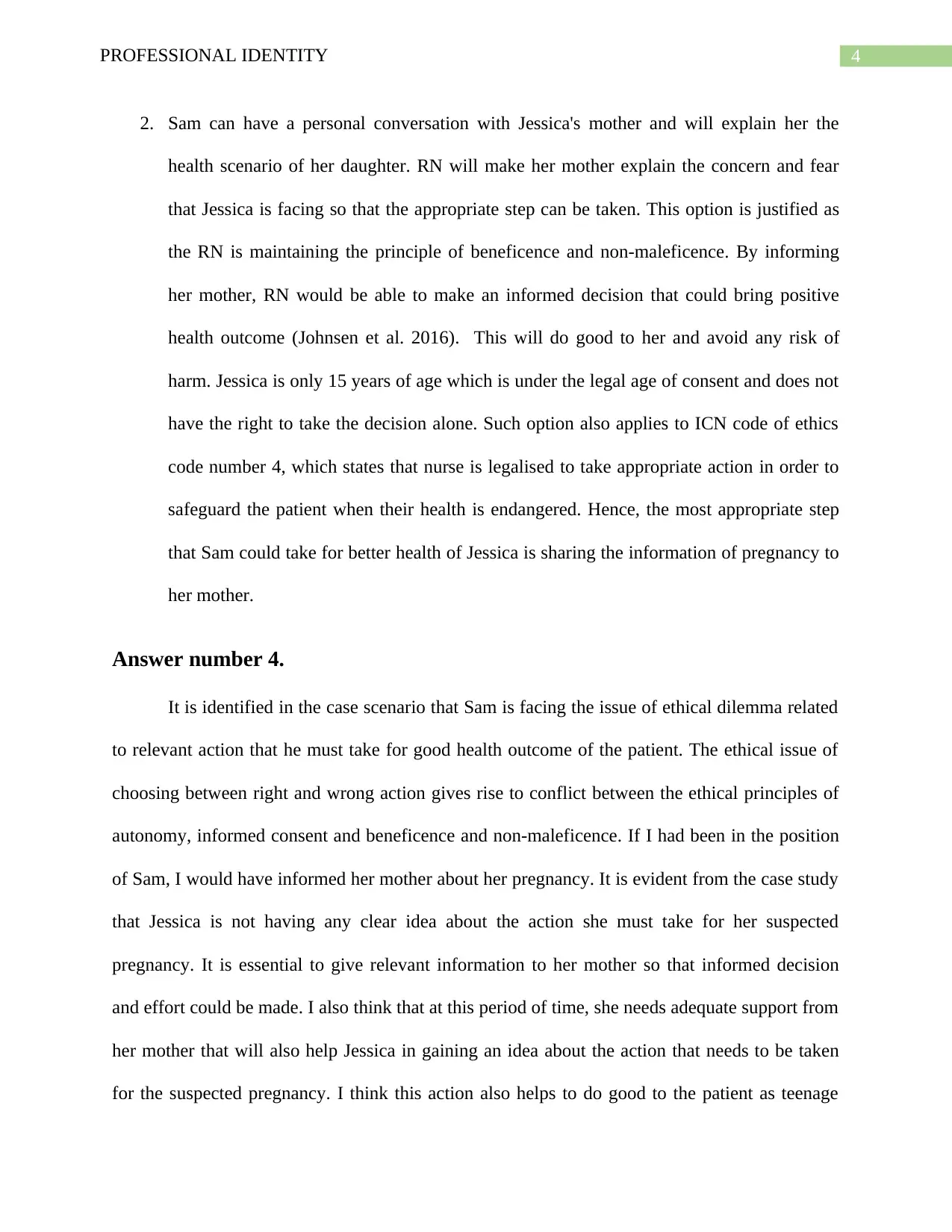
4PROFESSIONAL IDENTITY
2. Sam can have a personal conversation with Jessica's mother and will explain her the
health scenario of her daughter. RN will make her mother explain the concern and fear
that Jessica is facing so that the appropriate step can be taken. This option is justified as
the RN is maintaining the principle of beneficence and non-maleficence. By informing
her mother, RN would be able to make an informed decision that could bring positive
health outcome (Johnsen et al. 2016). This will do good to her and avoid any risk of
harm. Jessica is only 15 years of age which is under the legal age of consent and does not
have the right to take the decision alone. Such option also applies to ICN code of ethics
code number 4, which states that nurse is legalised to take appropriate action in order to
safeguard the patient when their health is endangered. Hence, the most appropriate step
that Sam could take for better health of Jessica is sharing the information of pregnancy to
her mother.
Answer number 4.
It is identified in the case scenario that Sam is facing the issue of ethical dilemma related
to relevant action that he must take for good health outcome of the patient. The ethical issue of
choosing between right and wrong action gives rise to conflict between the ethical principles of
autonomy, informed consent and beneficence and non-maleficence. If I had been in the position
of Sam, I would have informed her mother about her pregnancy. It is evident from the case study
that Jessica is not having any clear idea about the action she must take for her suspected
pregnancy. It is essential to give relevant information to her mother so that informed decision
and effort could be made. I also think that at this period of time, she needs adequate support from
her mother that will also help Jessica in gaining an idea about the action that needs to be taken
for the suspected pregnancy. I think this action also helps to do good to the patient as teenage
2. Sam can have a personal conversation with Jessica's mother and will explain her the
health scenario of her daughter. RN will make her mother explain the concern and fear
that Jessica is facing so that the appropriate step can be taken. This option is justified as
the RN is maintaining the principle of beneficence and non-maleficence. By informing
her mother, RN would be able to make an informed decision that could bring positive
health outcome (Johnsen et al. 2016). This will do good to her and avoid any risk of
harm. Jessica is only 15 years of age which is under the legal age of consent and does not
have the right to take the decision alone. Such option also applies to ICN code of ethics
code number 4, which states that nurse is legalised to take appropriate action in order to
safeguard the patient when their health is endangered. Hence, the most appropriate step
that Sam could take for better health of Jessica is sharing the information of pregnancy to
her mother.
Answer number 4.
It is identified in the case scenario that Sam is facing the issue of ethical dilemma related
to relevant action that he must take for good health outcome of the patient. The ethical issue of
choosing between right and wrong action gives rise to conflict between the ethical principles of
autonomy, informed consent and beneficence and non-maleficence. If I had been in the position
of Sam, I would have informed her mother about her pregnancy. It is evident from the case study
that Jessica is not having any clear idea about the action she must take for her suspected
pregnancy. It is essential to give relevant information to her mother so that informed decision
and effort could be made. I also think that at this period of time, she needs adequate support from
her mother that will also help Jessica in gaining an idea about the action that needs to be taken
for the suspected pregnancy. I think this action also helps to do good to the patient as teenage
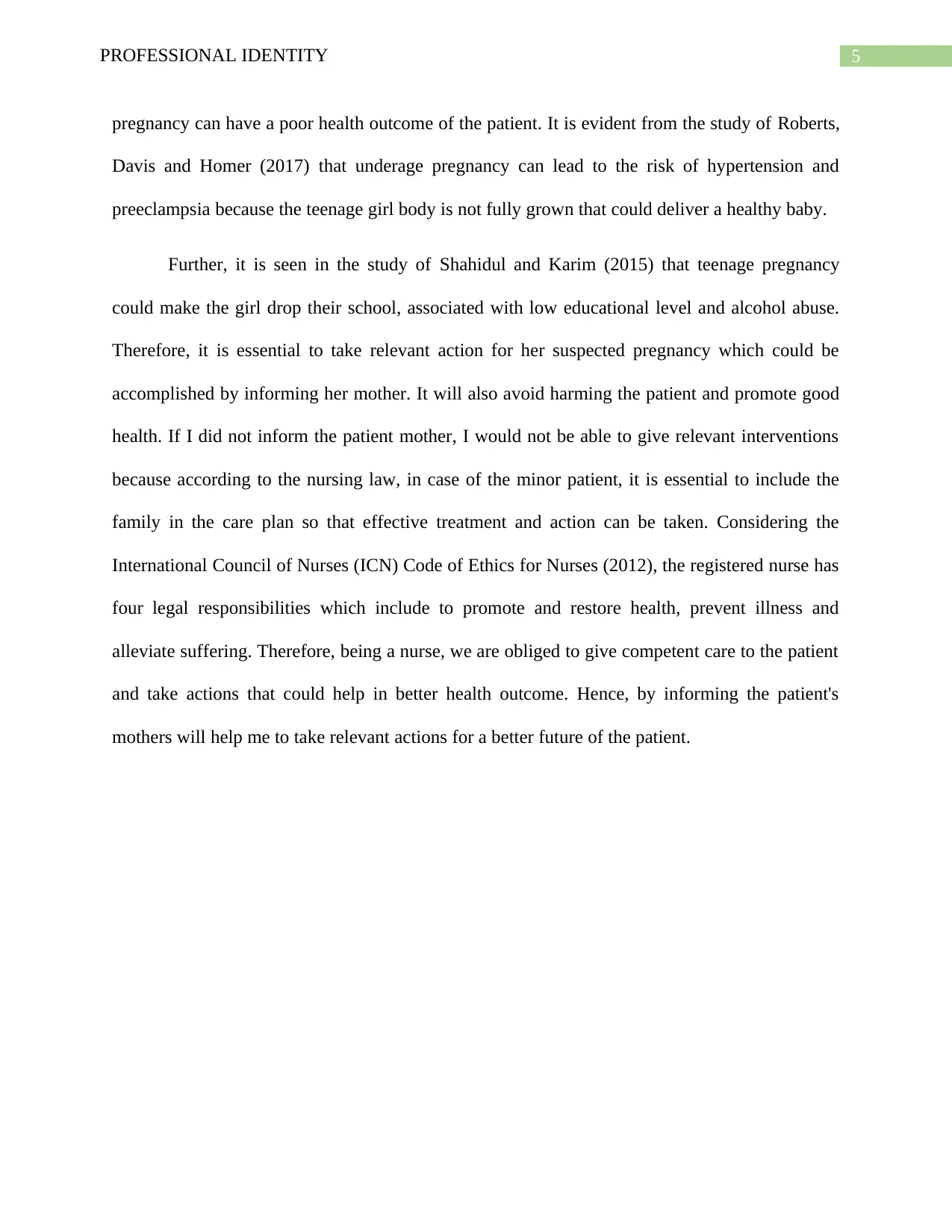
5PROFESSIONAL IDENTITY
pregnancy can have a poor health outcome of the patient. It is evident from the study of Roberts,
Davis and Homer (2017) that underage pregnancy can lead to the risk of hypertension and
preeclampsia because the teenage girl body is not fully grown that could deliver a healthy baby.
Further, it is seen in the study of Shahidul and Karim (2015) that teenage pregnancy
could make the girl drop their school, associated with low educational level and alcohol abuse.
Therefore, it is essential to take relevant action for her suspected pregnancy which could be
accomplished by informing her mother. It will also avoid harming the patient and promote good
health. If I did not inform the patient mother, I would not be able to give relevant interventions
because according to the nursing law, in case of the minor patient, it is essential to include the
family in the care plan so that effective treatment and action can be taken. Considering the
International Council of Nurses (ICN) Code of Ethics for Nurses (2012), the registered nurse has
four legal responsibilities which include to promote and restore health, prevent illness and
alleviate suffering. Therefore, being a nurse, we are obliged to give competent care to the patient
and take actions that could help in better health outcome. Hence, by informing the patient's
mothers will help me to take relevant actions for a better future of the patient.
pregnancy can have a poor health outcome of the patient. It is evident from the study of Roberts,
Davis and Homer (2017) that underage pregnancy can lead to the risk of hypertension and
preeclampsia because the teenage girl body is not fully grown that could deliver a healthy baby.
Further, it is seen in the study of Shahidul and Karim (2015) that teenage pregnancy
could make the girl drop their school, associated with low educational level and alcohol abuse.
Therefore, it is essential to take relevant action for her suspected pregnancy which could be
accomplished by informing her mother. It will also avoid harming the patient and promote good
health. If I did not inform the patient mother, I would not be able to give relevant interventions
because according to the nursing law, in case of the minor patient, it is essential to include the
family in the care plan so that effective treatment and action can be taken. Considering the
International Council of Nurses (ICN) Code of Ethics for Nurses (2012), the registered nurse has
four legal responsibilities which include to promote and restore health, prevent illness and
alleviate suffering. Therefore, being a nurse, we are obliged to give competent care to the patient
and take actions that could help in better health outcome. Hence, by informing the patient's
mothers will help me to take relevant actions for a better future of the patient.
⊘ This is a preview!⊘
Do you want full access?
Subscribe today to unlock all pages.

Trusted by 1+ million students worldwide
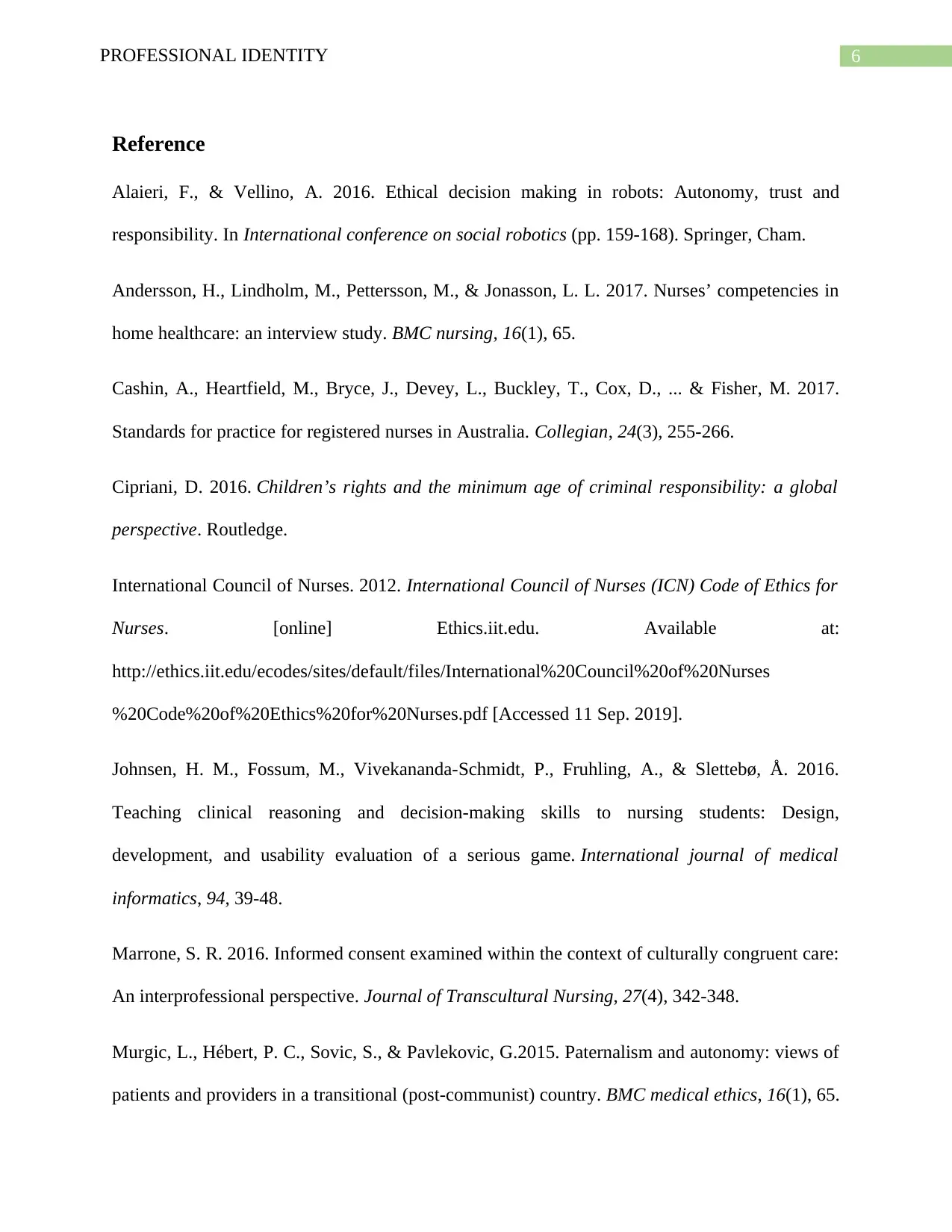
6PROFESSIONAL IDENTITY
Reference
Alaieri, F., & Vellino, A. 2016. Ethical decision making in robots: Autonomy, trust and
responsibility. In International conference on social robotics (pp. 159-168). Springer, Cham.
Andersson, H., Lindholm, M., Pettersson, M., & Jonasson, L. L. 2017. Nurses’ competencies in
home healthcare: an interview study. BMC nursing, 16(1), 65.
Cashin, A., Heartfield, M., Bryce, J., Devey, L., Buckley, T., Cox, D., ... & Fisher, M. 2017.
Standards for practice for registered nurses in Australia. Collegian, 24(3), 255-266.
Cipriani, D. 2016. Children’s rights and the minimum age of criminal responsibility: a global
perspective. Routledge.
International Council of Nurses. 2012. International Council of Nurses (ICN) Code of Ethics for
Nurses. [online] Ethics.iit.edu. Available at:
http://ethics.iit.edu/ecodes/sites/default/files/International%20Council%20of%20Nurses
%20Code%20of%20Ethics%20for%20Nurses.pdf [Accessed 11 Sep. 2019].
Johnsen, H. M., Fossum, M., Vivekananda-Schmidt, P., Fruhling, A., & Slettebø, Å. 2016.
Teaching clinical reasoning and decision-making skills to nursing students: Design,
development, and usability evaluation of a serious game. International journal of medical
informatics, 94, 39-48.
Marrone, S. R. 2016. Informed consent examined within the context of culturally congruent care:
An interprofessional perspective. Journal of Transcultural Nursing, 27(4), 342-348.
Murgic, L., Hébert, P. C., Sovic, S., & Pavlekovic, G.2015. Paternalism and autonomy: views of
patients and providers in a transitional (post-communist) country. BMC medical ethics, 16(1), 65.
Reference
Alaieri, F., & Vellino, A. 2016. Ethical decision making in robots: Autonomy, trust and
responsibility. In International conference on social robotics (pp. 159-168). Springer, Cham.
Andersson, H., Lindholm, M., Pettersson, M., & Jonasson, L. L. 2017. Nurses’ competencies in
home healthcare: an interview study. BMC nursing, 16(1), 65.
Cashin, A., Heartfield, M., Bryce, J., Devey, L., Buckley, T., Cox, D., ... & Fisher, M. 2017.
Standards for practice for registered nurses in Australia. Collegian, 24(3), 255-266.
Cipriani, D. 2016. Children’s rights and the minimum age of criminal responsibility: a global
perspective. Routledge.
International Council of Nurses. 2012. International Council of Nurses (ICN) Code of Ethics for
Nurses. [online] Ethics.iit.edu. Available at:
http://ethics.iit.edu/ecodes/sites/default/files/International%20Council%20of%20Nurses
%20Code%20of%20Ethics%20for%20Nurses.pdf [Accessed 11 Sep. 2019].
Johnsen, H. M., Fossum, M., Vivekananda-Schmidt, P., Fruhling, A., & Slettebø, Å. 2016.
Teaching clinical reasoning and decision-making skills to nursing students: Design,
development, and usability evaluation of a serious game. International journal of medical
informatics, 94, 39-48.
Marrone, S. R. 2016. Informed consent examined within the context of culturally congruent care:
An interprofessional perspective. Journal of Transcultural Nursing, 27(4), 342-348.
Murgic, L., Hébert, P. C., Sovic, S., & Pavlekovic, G.2015. Paternalism and autonomy: views of
patients and providers in a transitional (post-communist) country. BMC medical ethics, 16(1), 65.
Paraphrase This Document
Need a fresh take? Get an instant paraphrase of this document with our AI Paraphraser
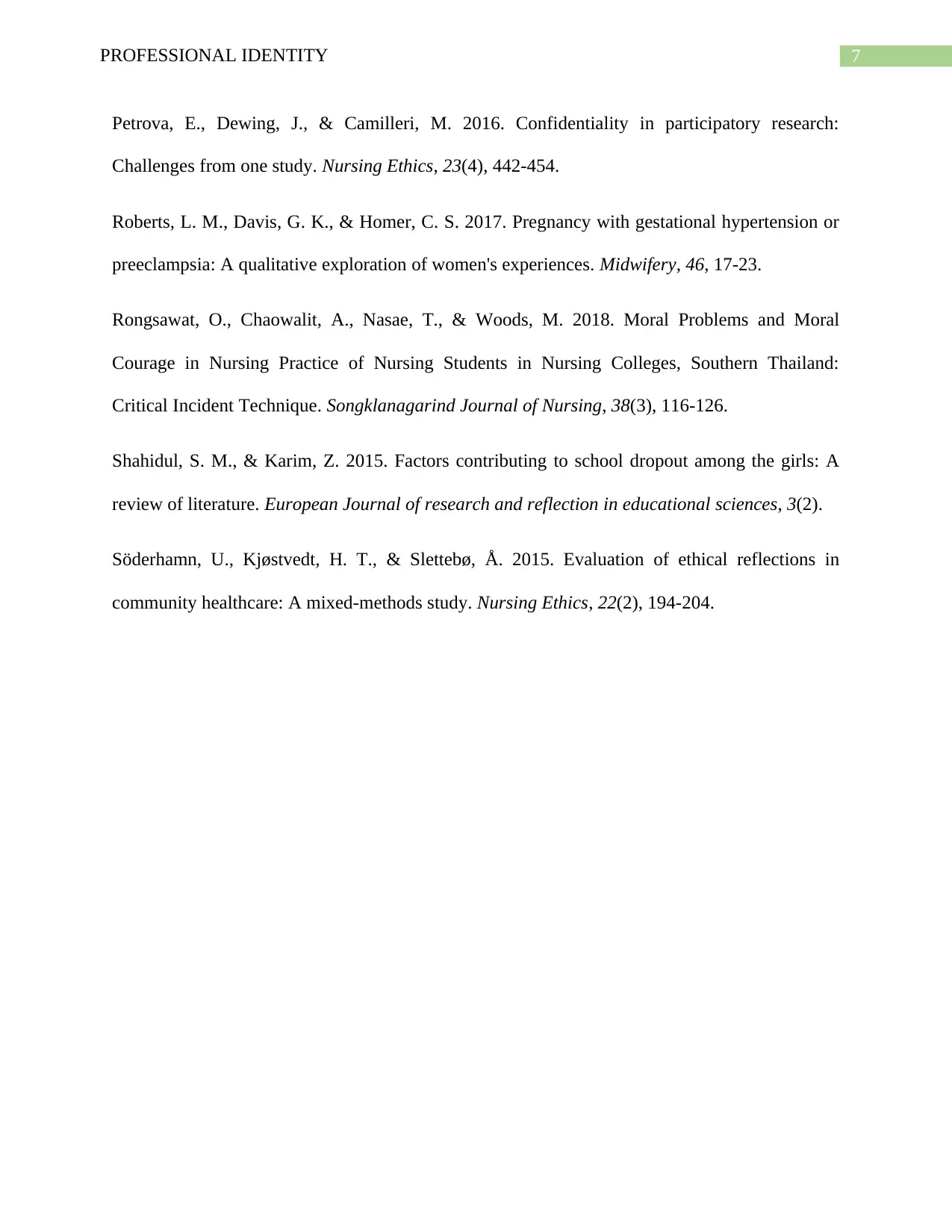
7PROFESSIONAL IDENTITY
Petrova, E., Dewing, J., & Camilleri, M. 2016. Confidentiality in participatory research:
Challenges from one study. Nursing Ethics, 23(4), 442-454.
Roberts, L. M., Davis, G. K., & Homer, C. S. 2017. Pregnancy with gestational hypertension or
preeclampsia: A qualitative exploration of women's experiences. Midwifery, 46, 17-23.
Rongsawat, O., Chaowalit, A., Nasae, T., & Woods, M. 2018. Moral Problems and Moral
Courage in Nursing Practice of Nursing Students in Nursing Colleges, Southern Thailand:
Critical Incident Technique. Songklanagarind Journal of Nursing, 38(3), 116-126.
Shahidul, S. M., & Karim, Z. 2015. Factors contributing to school dropout among the girls: A
review of literature. European Journal of research and reflection in educational sciences, 3(2).
Söderhamn, U., Kjøstvedt, H. T., & Slettebø, Å. 2015. Evaluation of ethical reflections in
community healthcare: A mixed-methods study. Nursing Ethics, 22(2), 194-204.
Petrova, E., Dewing, J., & Camilleri, M. 2016. Confidentiality in participatory research:
Challenges from one study. Nursing Ethics, 23(4), 442-454.
Roberts, L. M., Davis, G. K., & Homer, C. S. 2017. Pregnancy with gestational hypertension or
preeclampsia: A qualitative exploration of women's experiences. Midwifery, 46, 17-23.
Rongsawat, O., Chaowalit, A., Nasae, T., & Woods, M. 2018. Moral Problems and Moral
Courage in Nursing Practice of Nursing Students in Nursing Colleges, Southern Thailand:
Critical Incident Technique. Songklanagarind Journal of Nursing, 38(3), 116-126.
Shahidul, S. M., & Karim, Z. 2015. Factors contributing to school dropout among the girls: A
review of literature. European Journal of research and reflection in educational sciences, 3(2).
Söderhamn, U., Kjøstvedt, H. T., & Slettebø, Å. 2015. Evaluation of ethical reflections in
community healthcare: A mixed-methods study. Nursing Ethics, 22(2), 194-204.
1 out of 8
Related Documents
Your All-in-One AI-Powered Toolkit for Academic Success.
+13062052269
info@desklib.com
Available 24*7 on WhatsApp / Email
![[object Object]](/_next/static/media/star-bottom.7253800d.svg)
Unlock your academic potential
Copyright © 2020–2026 A2Z Services. All Rights Reserved. Developed and managed by ZUCOL.




